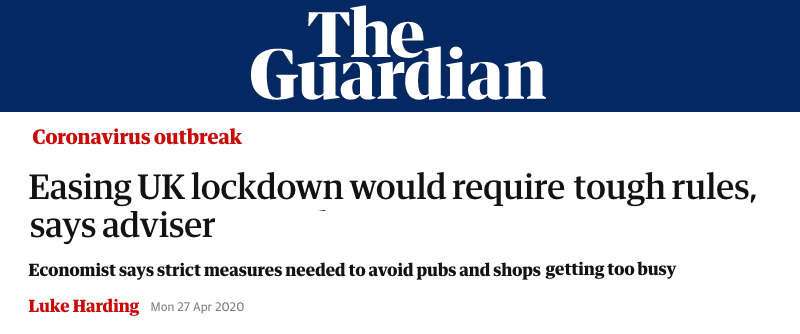

An economist who has been advising the government over how to ease the national lockdown has said pubs, shops and restaurants could reopen as long as there was mandatory physical distancing and fines for those abusing the rules.
Speaking to the Guardian, Eyal Winter said ministers could allow a broader resumption of activity, but only if it was accompanied by a stricter level of enforcement.
Winter said the Cabinet Office was deeply concerned that some people would behave inappropriately as soon as lockdown was ended. One fear was that pubs would get very full. “People are starving for pubs. They are an important part of British culture,” he said.
Winter, an economist at Lancaster University, is part of a team of behavioural experts who have been advising the government since April.
His views have been shared with the cabinet office as ministers consider a range of options for how the UK might emerge from the coronavirus crisis.
Winter said he opposed opening up the UK economy sector by sector. He has argued his blueprint would be more equitable than a gradual easing of restrictions, which could fuel resentment among those still unable to work.
He said the government should follow a German-style approach, with clear dates and targets. “One of the most important things is to have a programme, to say, ‘in two weeks we will do such and such’,” he said. “You need to make the rules crystal clear, and to explain to the public the rationale behind each one of them.”
He was sceptical that official “nudge” warnings would keep people out of bars, putting them at risk of getting the virus or unwittingly passing it to others. One solution would be for landlords to ration how much beer they serve, to two or three pints, he said. Customers would then be politely asked to go home.
Landlords and shop owners should be tasked with enforcing these new rules and to monitoring customer numbers, he said.
He envisaged theatres and cinemas would also reopen but sell half as many tickets as before, with gaps in seating. Prices could be raised to cover revenue shortfalls.
A similar empty “middle-seat” policy was likely to be introduced on planes, he said. Travel would restart with a “low version of social distancing”. Winter was dismissive of Michael O’Leary, the boss of Ryanair, who last week said he wouldn’t bother flying his planes in this “idiotic” scenario. Winter pointed to the recent collapse in the global oil price. Restrictions “wouldn’t be for eternity”, he stressed.
Some changes, such as the use of Zoom and other homeworking technologies, were good, he said. Overall, Winter said he was confident the world would eventually return to its pre-virus state. This would probably take two years, assuming the planet avoided future pandemics.

“Some people have an apocalyptic view of this. I’m old enough to remember 9/11. We had exactly the same impression afterwards then. We thought: ‘It’s over. We will lock ourselves in shelters. We will stop flying.’ It never happened,” he pointed out. He added: “It will take a lot of time to move back to January 2020. But we will get there.”

Winter – who is also a professor at the Hebrew University’s centre for the study of rationality – was speaking from his home between Jerusalem and Tel Aviv. He has also been advising the government in Israel, where the death toll from coronavirus has been significantly lower than in the UK. He is due to hold further discussions on Tuesday with the Cabinet Office’s behavioural science group. The group feeds policy ideas to government. Not all are accepted, Winter said.
Another prominent adviser to the Cabinet Office is Daniel Kahneman, the Israeli-American economist and Nobel laureate, celebrated for his work on the psychology of judgement and decision making. Kahneman declined to comment.
Winter said that the group had discussed the gruelling psychological toll that lockdown was having on individuals. Some were “taking more risks”. Others were experiencing high levels of anxiety, which left them open to being scammed or to going on irrational spending sprees.
He predicted that crime and violence were likely to jump once the lockdown was over. He also anticipated a period of social division, with grievances among those who felt they had suffered more than others. Branding some workers essential and others superfluous was unwise. This could leave citizens feeling they had been treated unfairly, he said.
The Cabinet Office confirmed its team had spoken to Winter about exit lockdown strategy. It said the government sought advice from a wide range of experts including academics, healthcare professionals and business leaders.
Boris Johnson has been reluctant to explain his thinking on how the lockdown might end. This is causing frustration among some Tory MPs, as well as to millions of workers who have seen their incomes evaporate. The UK’s position is increasingly anomalous: other European countries have revealed timetables for the reopening of schools and non-essential businesses.